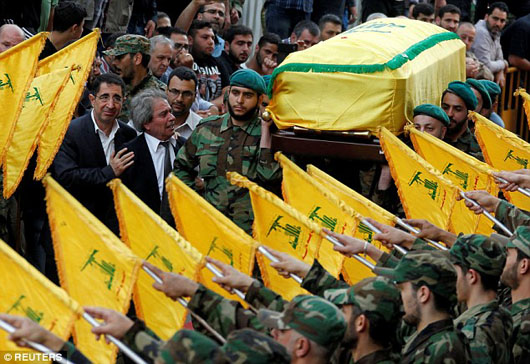by WorldTribune Staff, July 18, 2017
Pro-Russian factions inside the Syrian regime’s inner circle are pressing President Bashar Assad to cut Syria’s alliance with Iran-backed Hizbullah, a report said.
“There is a pro-Moscow faction that wants Syria to be secular and includes officers who trained in Russia,” said Ayman Abdel Nour, publisher of the largest anti-Assad Syrian news portal and leader of the country’s exiled Christian community based in Dubai.

“Those who support Iran are people bought by the Iranians or [who] reached their positions of power with Iranian help,” Abdel Nour said.
Six years of civil war have seen Syria and Hizbullah forging different strategic visions, and even at times engaging in open clashes, analysts Assad Hanna and Jacob Wirtschafter wrote for The Washington Times on July 17.
Hizbullah, a Syrian ally for some 40 years, has been hesitant to implement Russian-brokered cease-fire agreements.
The Kremlin is looking for Assad to change Syria’s arrangement with Hizbullah and other Iranian-funded Shi’ite militias that give Teheran nominal control of the country in exchange for little direct supervision by the regime’s officer corps, the report said.
“The Russians have been pressuring the Syrian regime to integrate the militias it created since the inception of the uprising into its armed forces,” said Hilal Khashan, a politics professor at the American University of Beirut.
Command and control functions over Hizbullah fighters are directed by an officer corps drawn from Iran’s Islamic Revolutionary Guard Corps (IRGC).
“Hizbullah operates in Syria simply as an Iranian pawn,” Khashan said. Iran “uses Hizbullah as part of its scheme to establish a ground corridor from Iran to Lebanon. This is not something that sits well with the Russians, who are keen on limiting Teheran’s preponderance. Russia will not allow Iranian influence in Syria to become similar to Iraq.”
A tentative U.S.-Russia consensus on Syria seems destined to further strain the Hizbullah-Iran-Assad alliance, the report said.
Last month, the Hizbullah TV station Al-Manar broadcast footage of what it said was an Iranian drone tailing an American drone over eastern Syria. The announcer’s voice-over included a warning that Hizbullah will strike at U.S. positions inside Syria if America crosses any “red lines.”
“Of course, there are no free lunches in this area,” said Mordechai Kedar, a former Syria desk officer for Israel’s military intelligence agency. “Hizbullah wants to take its share in what seems to be the division of Syria. Three things will be required to get them to leave: Assad’s army will have to regain its power and self-confidence, the Russians have to demand it and the Iranians have to consent.”
Meanwhile, the Russian Defense Ministry has ordered aerial bombings of Shi’ite militia positions when Iran-backed forces interfered with plans to evacuate civilians to safe areas, the report said.
“The Hizbullah message has been: ‘Don’t think you can make a deal without us. We are on the ground, and we control what’s going on,’” said Ahmad Hardan, a 20-year-old ambulance driver from Aleppo detained by Lebanese Shi’ite fighters as he and his family fled their home.
“They took all the young men from the cars and drove us to the opposite side of the road. All those who tried to resist were killed,” Hardan said. “But suddenly there were Russian fighter jets in the sky, the Hizbullah troops started shooting in the air, and then they let the evacuation proceed.”
Hizbullah’s role has been shrinking in Syria’s war, which began in 2011.
Nawar Oliver, an analyst at the Istanbul-based Omran Center for Strategic Studies, said Hizbullah’s estimated 10,000-member force in Syria is just one component that includes a 70,000-strong contingent of local Shi’ite militias deployed with Iraqi, Afghan and Pakistani fighters.
“The number decreased from an apex of about 15,000 to 20,000 because Hizbullah started recruiting and funding local Shi’ite militias in order to pull back some of their troops from Syria,” said Oliver, pointing to more than 1,000 Lebanese battle casualties and a desire to prepare for a likely conflict on the Israel-Lebanon border.
For the rebels and other anti-regime figures, it’s crucial that Hizbullah is forced out of Syria, the report said.
“Getting Hizbullah and the Iranians out is now our No. 1 priority,” said Abdel Nour, the anti-Assad news portal editor. “They want to convert all of Syria to Shi’ism, which is an ideology that [will lead to] them fighting with the majority of Sunnis in the country forever – and we don’t want that.”
Subscribe to Geostrategy-Direct __ Support Free Press Foundation__Drop Us A Line
